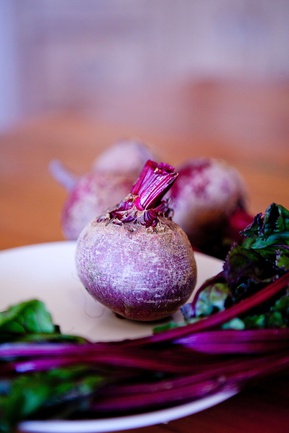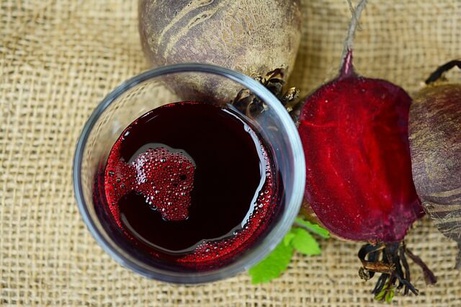The blood pressure also benefits from the nitrates contained in beet, after only a few hours. One study found that drinking a glass of beet juice reduces systolic blood pressure by an average of 4 to 5 points.
Another study shows that daily consumption of beet juice for four weeks leads to a decrease in hypertension, improvement in endothelial function and a reduction in arterial stiffness. According to the researchers:
"This is the first evidence of sustained blood pressure reduction with dietary nitrate supplementation.
It is an affordable and readily available adjunct for the treatment of patients with hypertension."
In addition to the blood pressure benefits, beet juice is also good for your brain. Nitrates, and the resulting nitric oxide, help increase blood flow to the brain in the elderly. With age, this decrease in blood flow to certain areas of the brain is associated with dementia and cognitive impairment.
When adults aged 70 and older eat a nitrate-rich breakfast, including beet juice, they increase blood flow to the white matter in their brains, area associated with dementia.
Powerful antioxidant, anti-inflammatory superstar.
If you love beets, there's a good reason to add them regularly to your meals. You can eat them raw, grated in salads, marinated with lemon juice, herbs and olive oil, as a side dish, or steamed; anything goes!
Beets boost the immune system, are rich in vitamin C, fiber and essential minerals such as potassium (essential for healthy nervous and muscular systems) and manganese (good for bones, liver, kidneys and pancreas). Beets are also a source of folic acid, or vitamin B, which helps reduce the risk of birth defects.
The betalain pigments present in beets support the detoxification process. Beets are known to help detoxify and purify the blood and liver.

Research has even shown that beet extract reduces tumor formation in different species of animals, while in humans it is used in the treatment of pancreatic, breast and other cancers. and prostate.
Beets are also an exceptional source of betaine, a nutrient that helps protect cells, proteins and enzymes from environmental stress. It is also known to help fight inflammation, protect internal organs, improve cardiovascular risk factors and performance, and most likely helps prevent many chronic diseases. As reported by the World's Healthiest Foods:
"The presence of betaine in our diet was associated with decreased levels of
several markers of inflammation such as C-reactive protein, interleukin-6, and tumor necrosis factor alpha. ".
High sugar content!
If the benefits of beet juice seem to be well established, it is important to keep in mind that it is a very high sugar vegetable. Beets are, in fact, the vegetable with the highest sugar content, although they also contain a wealth of vitamins, minerals and antioxidants.
For this reason, it is recommended to consume beet a few times a week to benefit from its nutritional qualities without overdosing on sugar. Beet juice is even more concentrated in sugar, without any fiber to moderate its effects, so limit its consumption!
If you have high blood pressure or heart failure, you can experiment with beet juice and see what it does for you. If you notice improvements in your blood pressure or stamina after drinking this juice, it may be a good solution. If you are diabetic or insulin resistant, it is recommended that you carefully monitor how beet juice affects you and moderate your intake.
Keep in mind that this article refers to the red beets that most people add to their salads and side dishes; this is not the same variety as the sugar beet which is white, mostly genetically modified and used in sugar production. So, if you are only interested in the amount of nitrates in beet juice

ave, you can eat other nitrate-rich foods such as celery, lettuce, parsley and spinach, which will be much lower in sugar.
Beet leaves contain important nutrients such as protein, phosphorus, zinc, fiber, vitamin B6, magnesium, potassium, copper and manganese. They also provide interesting quantities of vitamin A and C, calcium and iron.



